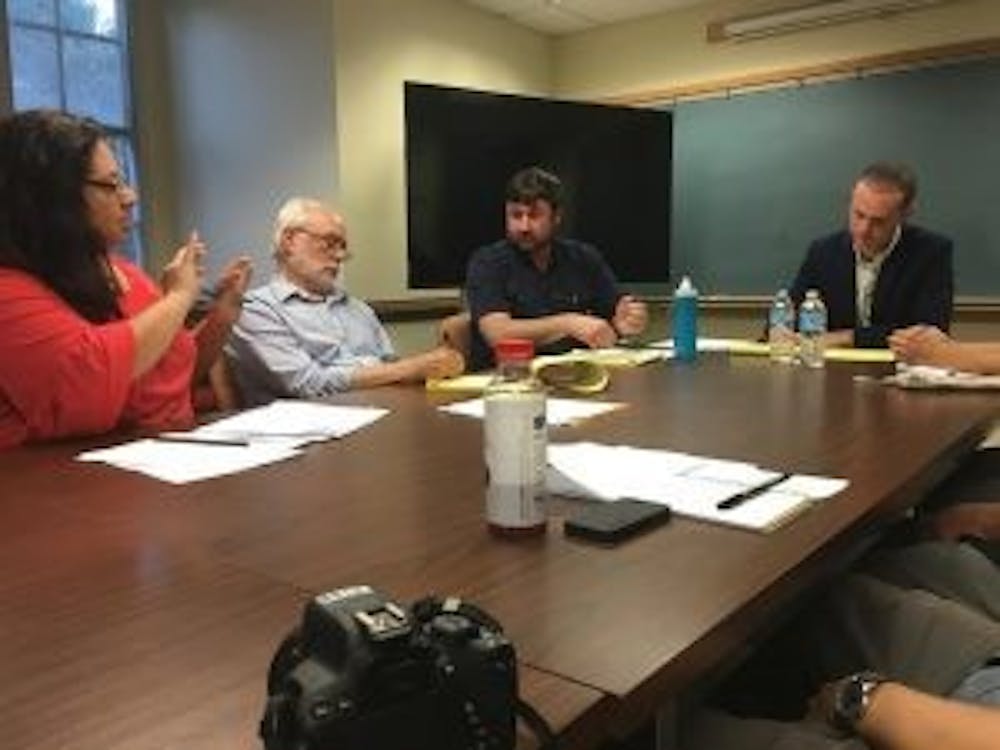Alex Hirsch, assistant political science professor at the University of Alaska, Fairbanks, presented his paper, “Hope against Hope: Counter-actualization in William Apess’ Native American political thought” as part of the Fall 2016 Colloquium Series, sponsored by the Program in Racism, Immigration and Citizenship (RIC).
P.J. Brendese, assistant professor of political science and a co-director of RIC, introduced Hirsch at the start of the event held in Mergenthaler on Wednesday Oct. 19.
“[Alex] works at the intersection of political theory, decolonial thought and indigenous studies,” Brendese said. “In general, Alex’s work explores how people survive in the aftermath of catastrophe and mass violence.”
Hirsch contextualized his work, emphasizing that his book, Hope Against Hope, remains a work-in-progress.
“This is a working paper. It’s a living, breathing document that is still unfurling. Its apparent verdicts to me are more like open-ended experiments. I think that’s a little bit, maybe, unusual for a talk such as this, where it’s more customary to deliver work that is more polished and complete,” Hirsch said. “But to me a really good talk is one that is more about exploration, exploring together, building a story together that is vivid and resonant and is less about exegesis.”
Hirsch originally planned to present another paper called “The Pocahontas Exception: Founding Forgetting and White Autochthony,” but ultimately chose “Hope against hope” in light of the controversy surrounding the Dakota Access Pipeline and Columbus day.
“Columbus Day was coming when I started to think about what paper I wanted to circulate. In Alaska, as elsewhere, the perennial struggle ensued over whether we might be able to convert that holiday’s meaning,” he said. “Then Standing Rock happened and the Lakota Protest Movement mobilized to thwart the construction of the Dakota Access Pipeline.”
Hirsch’s talk emphasized the impact of counter-actualization on indigenous cultures in the U.S.
“For me, indigenous counter-actualization is unnaming the past, re-narrativizing it, shattering the old stories and as they shatter, letting the stories proliferate into arcs and clusters of displacements that really can contribute to a kind of pluralizing of past potentialities in that process,” he said.
Senior Apricot Tang attended the lecture after Brendese recommended it to her. Tang, a political science major, had taken classes with some of the other professors who attended.
“All of these professors’ work intersects. I’ve only really noticed by taking separate classes with all of them, but seeing them in one room with the ability for them to talk to each other is exciting because instead of me having to sit and think about what they would say to each other, I’m literally going to witness [it].”
Ultimately, Hirsch reflected the mission of RIC by challenging those in attendance to critique his work and promote further discussion.
“I’m curious to hear your reactions and responses. We come and we do these talks for one another in the hopes that — by virtue of the fact that we’ve been completely entrenched in some mode of writing or some idea — we bring that idea to an audience in the hope that the audience can make it strange again, render that idea strange and foreign and uncanny once again.”





